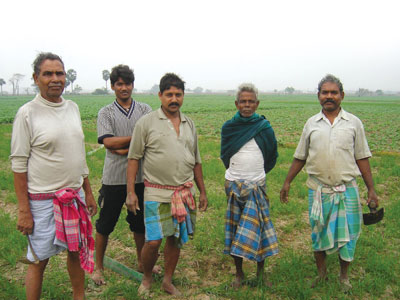 BITS OF NEWS.COM ANTI-SEZ: Farmers in Singur stand firm on their land in protests in 2008 against the West Bengal government's decision to set up an economic zone there. |
The Special Economic Zone (SEZ) bill will be tabled in parliament this year, and has already received a special mention in the budget speech last week. The government is keen on SEZs as a last ditch effort to woo foreign investors and create jobs.
The government circulated the draft of the bill 'Special Economic Zones Act 2008' three years back. It was either silent or deliberately unclear on three basic points: the environmental guidelines for the proposed SEZ, the rights of the workers in the SEZ and compliance measures for multi-national investors.
The proposed bill gives enormous power to the autonomous corporation to be established under the act which would be responsible for managing and monitoring the SEZ. What is most concerning is that the act does not have regulations to guide the functioning of the corporation. For instance, Article 3 of the proposed bill gives the corporation enormous power to select and recommend any part of the country as a SEZ. Article 4 specifies that the corporation must ensure that the proposed area is economically and logistically viable but does not require the project to conduct an Environment Impact Assessment or Social Impact Assessment.
Similarly, Article 6 give the corporation power to transfer the establishment and administrative role of the SEZ to the private sector. In the absence of clear environmental and social guidelines, there is a danger that private management might turn indifferent to possible threats to local livelihood and biodiversity posed by future industries. The Bhrikuti Paper Industry in Narayangad is an example of failed safeguards that has led not just to massive pollution of the Narayani river just upstream from a national park but also the loss of livelihood of hundreds of fisherfolks and their families.
Article 36 gives the corporation complete authority to decide on minimum wages, and Article 37 states that any issue of worker's social security will be as per the individual contracts. This clearly means that the industries will have no obligation to abide by the national minimum wage or a standard working conditions and social security package including medical and life insurance. This raises philosophical and ethical questions on the responsibility of the state towards its citizens. Does our need for FDI outweigh the state's responsibility to protect its citizens?
Ujjaini Halim, who has studied the SEZs in Asia closely over the years, writes in her research paper, Special Economic Zones (SEZs): Untold Agonies:, Experiences from Asian countires: 'Strong motivation of the governments behind the promotion of SEZs is the desire to overcome economic crisis and debt burdens. But the irony, in doing so most of these countries further expose themselves to a greater degree of vulnerability and risk, which was manifested in environmental, economic and social disasters at a later stage.'
Homegrown movements against SEZ in various Asian countries including India, Philippines, Vietnam and Thailand are reminders that the economic well-being of a nation cannot run counter to ecological and social well being of the society at large.
At risk of being labeled "anti-development" it is time to ask some basic questions about SEZs in Nepal:
• What are the priority industries that SEZ will cater to?
• How much of the raw materials can be supplied internally for the proposed industries?
• What kind of manpower and skills are needed for the proposed industries are available locally?
• Can we provide sufficient energy, water, roads, etc to ensure a competitive economy of scale?
Unless there are answers, there will be public skepticism about SEZs, and whether they will be any different than the industrial zones already existing in various parts of the country.



